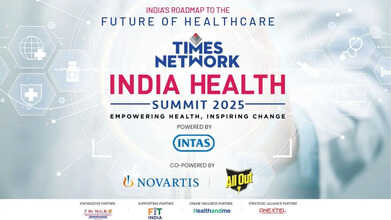- Health Conditions A-Z
- Health & Wellness
- Nutrition
- Fitness
- Health News
- Ayurveda
- Videos
- Medicine A-Z
- Parenting
- Web Stories
Internet Kills Creativity – Study Finds Using The Internet While Brainstorming Can Hinder Thought Process

(Credit-Canva)
People have the ability to come up with great, unique, and different ideas from the rest. However, we have all had days when brainstorming doesn't fruit any good ideas for us. So, the natural next step is to look on the internet. However, doing this is not only ruining your thought process but it is also killing your creativity. A new study shows that if you are looking for new ideas, you should stay off the internet.
Using the internet to find new ideas during group brainstorming sessions might actually stifle creativity, according to a study published on June 30 in the journal Memory & Cognition. Researchers found that internet searches can hinder a group's ability to generate truly original ideas
Internet's Impact on Creativity
The internet isn't making us less intelligent, but we might not be using it in the best ways for brainstorming. Researchers believe the internet can limit creativity because of something called "fixation effects." This means that when people see ideas from a search engine, they tend to think of other similar ideas. At the same time, these suggestions can block them from coming up with completely new or different answers.
For example, if someone is trying to list things you might "spread" and sees "butter" or "jam" from the internet, they're more likely to think of other foods like "cream cheese." They'll be less likely to think of non-food ideas, like "disease" or "rumors."
What the Study Showed
In a lab experiment with nearly 250 people, researchers looked at how groups came up with new uses for umbrellas and shields. They knew that there are many alternative uses for umbrellas online, but very few for shields.
Groups that had internet access struggled to find new ideas for umbrellas. This was probably because seeing so many suggestions online narrowed their thinking. On the other hand, because there weren't many pre-existing ideas for shields, groups had more room for their creativity to grow. This study provides the first proof that internet searches can cause this "fixation effect.
The results also showed that people who didn't use the internet were more imaginative. Those who used Google often came up with the same common answers, sometimes even in the same order. People who didn't use Google came up with more unique answers.
Smarter Ways to Brainstorm
However, researchers don't think we should avoid the internet when brainstorming. Instead, we need to find better ways to use search engines to boost our creative thinking.
The hope is to understand how human thought interacts with technology so we can get the most out of the internet while reducing its downsides. For instance, doing some brainstorming without the internet first could help avoid getting stuck on existing ideas. The goal isn't to give up the power of online search, but to learn how to use it more effectively.
Dealing With Creativity Blocks
Creativity blocks are normal, especially for people like designers writers as well as artists. However, due to the vagueness of this process, it is difficult to know when it will end or how to go about it. Here are some ways you can deal with it.
Identify the Root Cause
Pinpoint the core reason for your creative block. Is it a lack of inspiration, confidence, or clarity? Understanding if it's personal, professional, or environmental, and whether it's temporary or chronic, helps you address the issue effectively.
Break the Routine
Combat creative blocks by changing your routine. Alter your environment, schedule, tools, or methods to introduce new stimuli. Working differently sparks fresh ideas, refreshes your mind, and prevents boredom from stifling creativity.
Do Something Else
Sometimes, stepping away is best. Relax, recharge, and distract yourself from creative frustration. Engage in unrelated activities like reading, listening, or exercising. This helps you return with a fresh perspective, but avoid procrastination.
Experiment and Iterate
Overcome blocks by experimenting and iterating. Try different ideas and variations without attachment to perfection. Sketch, prototype, and revise to explore creative potential, discover new possibilities, and learn from any mistakes along the way.
Embrace the Challenge
Accept creative block as a natural part of the process, not a failure. Embracing it helps overcome fear and self-doubt, motivating continued progress. Acknowledge, reframe, learn, and even celebrate the challenge to improve skills.
Is Your Body Aging Too Quickly? 5 Warning Signs You Shouldn’t Ignore

Credits: Canva
Aging is a natural process. It happens when the rate at which our cells die begins to outpace the rate at which they regenerate. Every cell in the body has its own lifespan, for example, red blood cells live for around 100 to 120 days, while liver cells (hepatocytes) last about 200 to 300 days. Over time, as regeneration slows, the signs of aging begin to appear.
However, in some people, this process speeds up. Factors like long-term exposure to toxins, severe physical trauma, metabolic disorders such as cancer, or the failure of vital organs can push the body into premature aging. We got in touch with Dr Saurish Hegde, MD community medicine, Public health specialist who told us more about the same.
Warning Signs You May Be Aging Faster
- Constant fatigue and loss of energy: Everyday tasks feel harder, and the body tires more quickly than before.
- Skin and hair changes: Reduced collagen and keratin production leads to sagging, wrinkles, and thinning or loss of hair.
- Cognitive decline: Memory lapses, difficulty in planning, and problems with calculations may point to aging-related changes in the brain as grey matter begins to shrink.
- Chronic conditions: Lifestyle diseases like diabetes and hypertension are often tied to aging, linked to reduced insulin production and thicker, slower blood flow.
Can Premature Aging Be Prevented?
While no one can stop the clock, adopting healthy habits can slow it down. Regular physical activity, a diet rich in antioxidants from fruits and vegetables, quality sleep, and timely health screenings can all help delay the impact of aging and keep the body functioning better for longer.
What Causes Premature Aging?
In most cases, premature aging happens because of everyday habits or environmental factors that we can control. Doctors call this extrinsic aging. The first signs usually show up on the skin. While skin changes are a normal part of getting older, if they appear too early, lifestyle and surroundings are often to blame.
Light exposure is the biggest culprit
- Sunlight (UV rays): Too much sun speeds up skin aging, a process known as photoaging. This alone causes about 90% of the visible changes we see in skin, such as wrinkles, age spots, and rough texture. UV rays also damage cells, which raises the risk of skin cancer.
- Blue light and infrared light: The remaining 10% of skin damage comes from high-energy visible (blue) light and infrared light. Blue light comes from the sun and also from screens, while infrared is the heat we feel. These don’t raise cancer risk but they do weaken collagen and elasticity, making skin sag sooner.
- Smoking: Nicotine toxins break down collagen and elastin, causing sagging skin, wrinkles, and a hollow look.
- Poor diet: Diets high in sugar and refined carbs may speed up aging, while diets rich in fruits and vegetables help protect the skin.
- Alcohol: Heavy drinking dehydrates and damages skin over time.
- Lack of sleep: Poor or insufficient sleep has been linked to faster cellular aging.
- Chronic stress: High cortisol levels from stress reduce substances like collagen and hyaluronic acid that keep skin smooth and firm.
In rare cases, certain medical conditions can also cause early aging, such as progeria, Werner syndrome, Cockayne syndrome, Bloom syndrome, and a few other genetic disorders.
The Most Coveted Gathering of India’s Healthcare Leaders: TIMES NETWORK INDIA HEALTH SUMMIT 2025

India’s healthcare leaders are set to gather at the eagerly awaited TIMES NETWORK INDIA HEALTH SUMMIT 2025. With the country positioning itself as a global healthcare hub, the Modi government is pushing reforms aimed at creating a strong healthcare system. The sector has seen remarkable changes, driven by advancements in technology, improved infrastructure, and wider accessibility. Recognizing healthcare as a strategic pillar, the government views it as essential for national growth, public welfare, and economic stability.
In 2025, healthcare will remain an essential part of India’s economy, contributing significantly to GDP growth, job opportunities, and technological progress. The industry, valued at over $500 billion, sustains millions of jobs across hospitals, pharmaceuticals, biotechnology, and health-tech. Rising demand for quality care, especially in Tier 2 and Tier 3 cities, is pushing more investments and large-scale infrastructure development.
Efforts to strengthen public health are closely aligned with the Sustainable Development Goals (SDGs), emphasizing sustainable healthcare through optimal technology use. This year, the summit will focus on key themes such as “Making Healthcare Sustainable with Optimal Use of Technology” and “Adoption of Technology for Improved Accessibility and Affordability.”
The summit will host over 30 expert speakers, 300 delegates, and eight focused knowledge sessions. Attendees will discuss shaping global healthcare standards, achieving health equity, enhancing accessibility, advancing medical education, research, and driving innovation through technology.
Notable panels include “From Policy to Practice: Making Health Equity a Reality in India”, featuring Dr Sumit Kumar Dubey, Chief Medical Officer, NDMC; Dr Randeep Guleria, Director of Medanta Medical School; and Dr Narinder Mehra, Hon. Emeritus Scientist, ICMR. Another key session, “Battling Dengue in India: Crisis, Control and the Promise of Vaccination,” will include insights from Dr Sanjeev Bagai, Chairman, Nephron Clinic, and Dr Tanu Jain, Director, NCVBDC. TV actress Chhavi Mittal, a breast cancer survivor, will also share her personal journey.
Other highlights feature Dr Ananya Awasthi, Founder & Director of Anuvaad Solutions, and Dr Meenakshi Singh, Chief Scientist, CSIR, discussing nutraceuticals; Dr Shyam Aggarwal, Chairperson Oncology at Sir Ganga Ram Hospital, on cancer care; and Arvind Pachhapur of Strands Life Sciences, exploring AI-driven healthcare solutions. Additional sessions on youth mental health and healthcare infrastructure promise to offer actionable insights for stakeholders.
For more details, visit TIMES NETWORK INDIA HEALTH SUMMIT 2025.
NHS Issues Omeprazole Warning: Safer Alternatives For Heartburn And Indigestion

Credits: Canva
NHS omeprazole warning: People who take the common heartburn and indigestion drug omeprazole have been cautioned by the NHS about its potential long-term risks. For those unversed, omeprazole belongs to a group of medicines called proton pump inhibitors (PPIs). These drugs work by reducing the amount of acid produced in the stomach and are often prescribed for acid reflux, heartburn, and related issues.
They target the stomach’s proton pumps, the enzymes responsible for producing acid. While omeprazole can be very effective, it isn’t the only solution. If you are avoiding the medicine duen to the NHS warning, or just simply struggling with side effects or prefer a more natural route, there are other options worth considering.
NHS Warning on Omeprazole’s Long-Term Use
According to new figures, nearly 73 million NHS prescriptions for PPIs like omeprazole were issued in England in 2022 to 23. Reports also show that around 15% of the UK population relies on PPIs, making them among the most commonly used medications in the country. Alongside heartburn, PPIs are used to manage conditions like indigestion, stomach ulcers, gastro-oesophageal reflux disease (GORD), and even to treat Helicobacter pylori infection when paired with antibiotics. With NHS experts now raising concerns, we spoke to a health professional who explained which safe alternatives people can turn to instead.
Alternatives to Omeprazole
Omeprazole is one of several PPIs available. This class of medication is used for GERD, stomach and duodenal ulcers, and certain bacterial stomach infections. Each drug in the group works by blocking acid pumps in the stomach, but individuals may respond differently. We got in touch with Dr Vishal Khurana, Director Gastroenterology, Metro Hospital, Faridabad who told, us, “If omeprazole causes side effects or drug interactions, switching to another PPI such as pantoprazole (Protonix) or rabeprazole (Aciphex) may be a safer option.”
Other alternatives include H2 blockers like famotidine (Pepcid AC), which reduce acid in a different way, or traditional antacids like Tums and Rolaids that provide quick but temporary relief. There are also newer prescription treatments such as vonoprazan (Voquezna) that could be considered.
Natural Remedies for Acid Reflux and Heartburn
Medication isn’t always the only answer. Many people find relief from acid reflux by making small but consistent dietary and lifestyle changes. Avoiding fatty or spicy foods, cutting back on alcohol, and eating smaller portions can all help reduce symptoms. Simple remedies like ginger tea, milk, or a small amount of apple cider vinegar may also soothe heartburn for some people.
In terms of supplements, deglycyrrhizinated licorice (DGL) has been linked to easing acid reflux, though quality can vary between brands, so it’s best to check with a pharmacist before trying.
Lifestyle habits matter too. Quitting smoking and maintaining a healthy weight have been shown to lower the risk of reflux significantly. While these changes are not always easy, their benefits go far beyond heartburn relief.
The NHS advice doesn’t mean everyone should stop using omeprazole right away, but it’s a reminder that safe alternatives exist, and making simple adjustments could help you avoid long-term risks while still keeping heartburn under control.
© 2024 Bennett, Coleman & Company Limited

